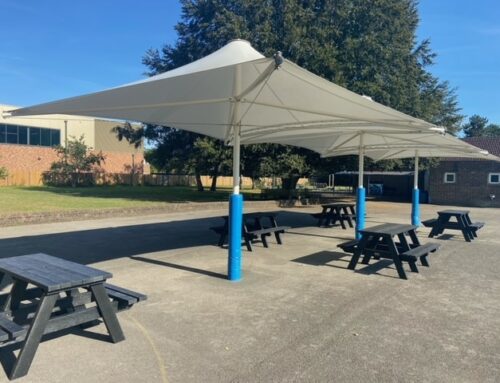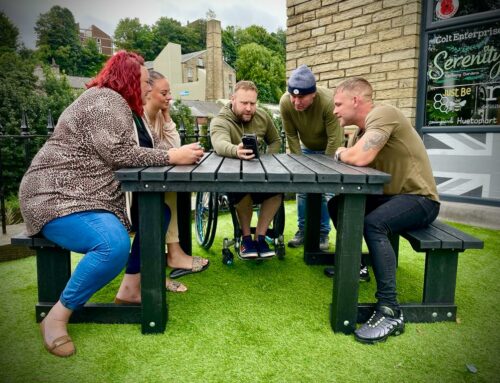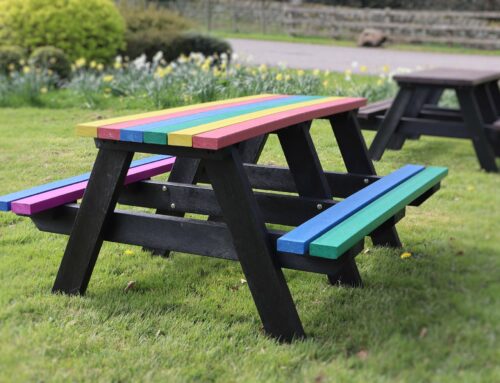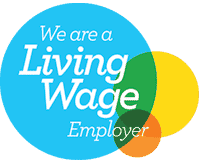When thinking about ways to recycle effectively, many of us will already be aware of ‘The 5 Rs’ of waste management: Refuse, Reduce, Reuse, Repurpose, Recycle.
These 5 are now joined by Rethink and Rot: all 7 are increasingly important for the survival
of Planet Earth.
What is the best way to navigate these 7 vital steps? How can we incorporate them into our
daily lives at both home and work? What is the difference between the 7? And how do we
begin to stem the flow of excess plastic waste on a personal, local, national and global level?
Helping To Answer These Questions
A recent post to our social media platforms highlighted some questions. Many of us are uncertain what to do for the best in relation to the waste we generate. When we consider the problem on a global scale and see images and news stories from around the world, the tide of non-recyclable waste can feel overwhelming. Our post called attention to a guy who creates seaworthy canoes from used, cleaned plastic bottles; just one person with one ingenious idea.
The area where he lives lacks affordable fishing vessels and has a huge plastic waste problem. He combined both issues and created a solution in the form of a successful business which supports the local community. The post was hugely popular with our followers and got us here at British Recycled Plastic contemplating more ways in which we could ‘think globally and act locally’ and ultimately, of ways in which we can reduce the rising tide of plastic waste.
Plastic Waste Management On A Global Scale
One thing is for certain – that a global problem such as plastic waste management cannot be solved by a single person, organisation or even by any one nation.
What works for us here in the UK might not work in India, for example. What happens in New Delhi – where almost 30% of the city’s recycling is carried out by local people in ‘informal’ local businesses, with no public funding – would not work within the vast business infrastructure of London.
However, a common goal can be reached. If world leaders were to legislate for a reduction in the production of virgin plastics and instigate global agreements on waste management, we feel there could be hope. Globally, the waste-management industry needs engagement from individual governments in the challenge of designing national systems. These systems would need to incorporate all levels of infrastructure as well as including important elements of the local economy and culture: everyone from street litter-pickers to big business would need to be involved and accommodated. It is counterproductive to establish new formal waste recycling systems without recognising and including existing informal systems. The preferred option is to integrate the informal sector into waste-management planning, building on their practices and experience while working to improve efficiency, as well as living and working conditions.
“It is necessary to strike a balance between a technology that boosts efficiency and productivity without taking away jobs from the informal recycling sector. Many cities in Latin America have tried to strike this balance by installing manual or semi-mechanised separation plants in which informal recyclers are employed or in which a cooperative is
contracted to operate the plant,” says the senior urban environment specialist at The World Bank, Washington DC.
The World Bank also notes, “Cities need consistent collection services, safe and environmentally sound disposal, and consistent enforcement of policy before targeted interventions for plastic can be fully effective. Without strong basic waste management systems, plastic is likely to continue to be dumped when uncollected, citizens and businesses are less likely to comply with restrictions on materials for consumption or manufacturing, and cost recovery for waste systems will continue to be a struggle”.
Tackling The Issue At A Manufacturing Level
Policy alone will not solve the issue of plastic mismanagement – incentivisation is required, as well as investment in institutions and systems. Plastic waste can be reduced or put to productive use at both a local and a global scale, but industries must be encouraged to alter manufacturing processes to reduce the amount of material needed, to use recycled materials as inputs, and to design new materials which degrade more readily or can be more easily recycled.
It is clear that we need new international systems to enhance the recycling and reuse of plastics which are already in circulation, rather than creating new materials from natural resources.
It seems imperative that we develop a global management solution to a) encourage communities across the world to deal with their own waste within their own countries and b) tailor local solutions to local needs.
Thinking Globally
As you may know, the UK will host the 26th UN Climate Change Conference of the Parties (COP26) in Glasgow from 31 October – 12 November 2021. The COP26 website states: ‘In the run up to COP26 the UK is working with every nation to reach agreement on how to tackle climate change. More than 190 world leaders are expected to arrive in Scotland, together with tens of thousands of negotiators, government representatives, businesses and citizens… for twelve days of talks’.
We will be watching closely to see where the talks lead. It is said that the urgency of these talks has never been greater.
As highlighted in our recent blog Looking Over The Horizon At The Future Of Recycling, dedicated ongoing global funding for recycling is essential. In order to scale-up recycling to the requires extent, mandatory fee-based business schemes will be essential. On a global scale we need to ensure that industries which introduce plastic into the world take responsibility for their products and that they contribute funding to collect and process their packaging after use.
The ‘7 Rs’ Of Waste Management
While the world leaders are discussing a circular economy and working out ways to Think Globally and Act Locally, how can we all help as individuals? As activist Greta Thunberg states: “I have learned you are never too small to make a difference.”
Rethink:
The way we think needs to alter; our throwaway culture needs to change. Re-think with others – share ideas and voice our opinions – both in person and online. One challenge is getting people to sort their waste at home. In Taiwan, recycling trucks play classical music tunes like Beethoven’s “Fur Elise” to alert people to run down from their apartments.
Refuse:
Saying “no” to items which become instant waste.
Reduce:
Before making purchases, ask yourself if you really need this item. If you do, look at the quality. While price is a huge factor, try to find the best quality in your budget. Well-made products will last longer, reducing the times you’ll need to repurchase – Buy Once, Buy Well. ‘Reduce’ also means letting go of things that are no longer of use by donating or selling them.
Reuse:
Invest in items which can be repaired, mended, or patched up. Reduce the chances of items breaking in the first place by opting for quality purchases.
Repurpose:
Adapt an item for use in a different purpose. Almost anything can be repurposed – old teapots as plant holders, tyres as boat fenders, jam jars as dry food containers, old towels as cleaning cloths – the list is endless.
Recycle:
Lobby locally for better and increased recycling services in your area. Again, make your voice heard. Increase yield and reduce contamination by washing items before recycling them and sorting them carefully.
Rot:
Compost your own household waste or take part in a composting program for organic waste.
As someone once said “Don’t waste time striving for all solutions to be met instantly. We don’t need a handful of people doing zero waste perfectly. We need millions of people doing it imperfectly.”
Recycling Effectively – In Conclusion:
We need to work together to find global solutions to waste management; to see the bigger picture; to think globally and work locally. We call for strategies and guidance from world leaders. Ideally, we’ll all work together within our local area to educate, discuss and build on ideas which work for our region. And it’s essential that we work on personal solutions which help the overall betterment of waste management.
Find out more about the canoe-building project at MadibaNature.
About British Recycled Plastic
British Recycled Plastic provides a range of ultra-tough products that keep plastic out of landfill and put to good use; our products can be returned for recycling at the end of their useful life. We’re proud of how our role in the world of recycling is helping to reduce landfill mass and create products that are useful, long lasting and beautiful. Engineered from 100% British waste, our products are guaranteed for 25 years and supplied to thousands of organisations and private homes across the UK: we believe our products are the very best that money can buy.
Visit British Recycled Plastics Webshop
Get in touch with our friendly and knowledgeable team by phone or email:
01422 419 555
[email protected]
Do check back as we update our blog regularly.
You’ll find more tips to recycle effectively, as well as other relevant topics.













